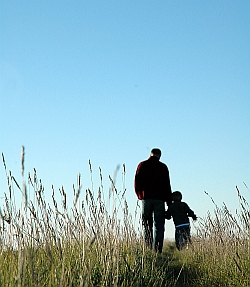 In response to the ungrateful cries and complaints of the Jewish people, G-d sent a plague of poisonous snakes. Moses put the form of a copper snake on a pole and raised it up high, and as people would gaze at the snake they would be healed. The Mishna (Rosh Hashana 29a) asks, “Could it be that the snake healed them?! Rather, when they would look upwards and devote their hearts to their Father in heaven, they would be healed.”
In response to the ungrateful cries and complaints of the Jewish people, G-d sent a plague of poisonous snakes. Moses put the form of a copper snake on a pole and raised it up high, and as people would gaze at the snake they would be healed. The Mishna (Rosh Hashana 29a) asks, “Could it be that the snake healed them?! Rather, when they would look upwards and devote their hearts to their Father in heaven, they would be healed.”
Rabbi Chaim of Volzhin zt”l (Nefesh HaChaim 2:11) understands this devotion of hearts as the ultimate form of prayer. Internalizing the Al-mighty — not our doctor, wealthy cousin, or bottle of whiskey — as the true “go to” source for our aches and pains is a high level of spiritual maturity and is certainly laudable. But that’s not a relationship of love. Turning to someone only when we’re in pain is taking, not giving. Love of G-d means turning to G-d when G-d Himself is in pain. When is He in pain? When we’re in pain He experiences the pain too — “I am with him in pain” (Psalms 91:15).
After suffering from the poisonous snake bites they turned to Heaven, but they didn’t ask for healing. They devoted their hearts to their Father, considering and contemplating how distraught He must feel to watch His children suffer. They also considered how G-d must feel to see His children faltering in their faith, wanting to be back in Egypt rather than under G-d’s care in the desert. Imagine the pain of a father and mother when their child doesn’t want to be around them, refuses to visit, and disregards their years of loving commitment. The plague-stricken people put aside their own pain and focused on their Father’s. That expression of total devotion, of love, moved G-d to remove the pain they were suffering, for His children were returning.
It hurts Him to see us move away from Him, and it hurts Him to take the painful measures needed to bring us back to Him, our life-source. Let’s feel His pain and walk with Him again.
Good Shabbos!
Rabbi Mordechai Dixler
Program Director, Project Genesis – Torah.org





I do believe with all my heart that Hashem/The Holy Essence/the Living Be-ing absolutely ‘senses’ the sorrow we in this world cause. And since i also believe that Hashem is breathing into me constantly (or how would I remain alive) I think when I feel sadness within the world of humanity, Hashem experiences that as well…and perhaps that is what causes deep sorrow. To know that the Creator Of It All senses when we are off. Shabbat Shalom
Rabbi, I seldom meet Jewish people who even think in the least of the pain G-d suffers when we ignore His love, His commandments, His daily blessings in various disguises or not so disguised.
Do we neglect Tehillim? How beautiful is Psalm 130 and 131 is so moving. David hamelech found rest in Hashem’s presence as a weaned child with its mother. How touching, how wonderfully simple..Todah rabbah Rabbi. May many experience the Shechina…and draw closer to Hashem’s heart. May you be blessed.